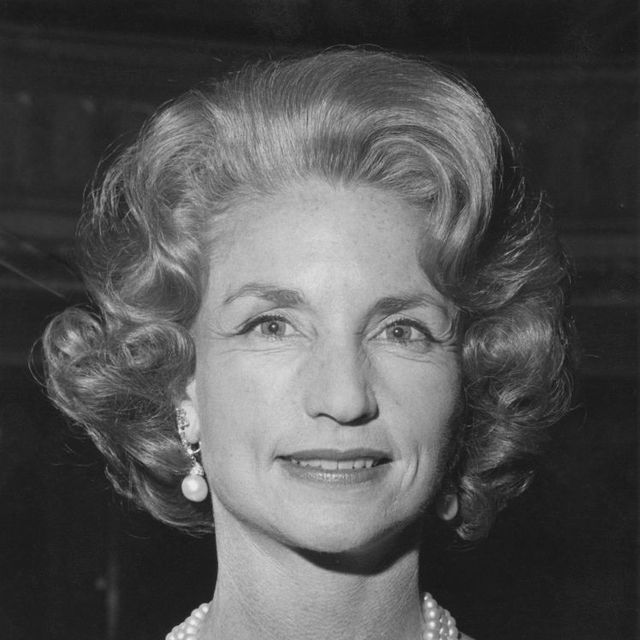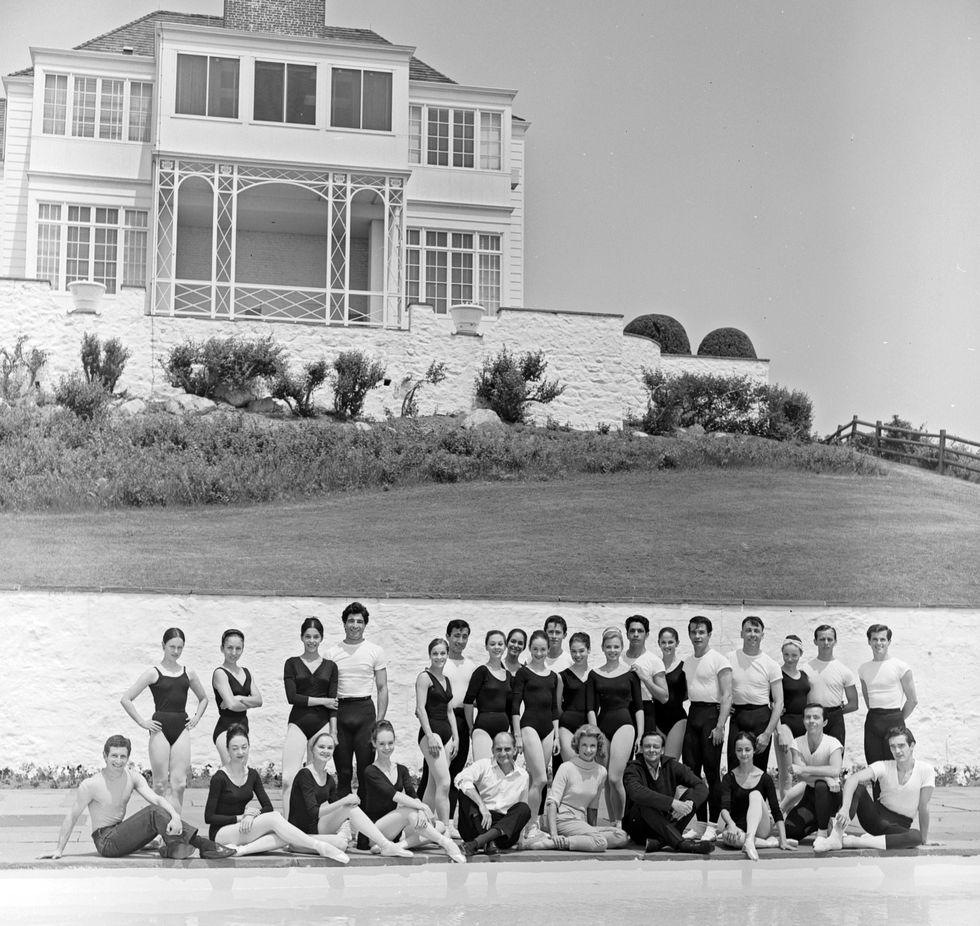- Taylor Swift's eighth album, Folklore, was released on July 24, and features 16 songs written and produced since the coronavirus pandemic began.
- "The Last Great American Dynasty" tells the story of Rebekah Harkness, the socialite who used to live in Swift's Rhode Island mansion.
- Read on for the true story behind "The Last Great American Dynasty's" lyrics.
Folklore, Taylor Swift's latest album, is officially out, which means it's time to close-read the lyrics and find the hidden meaning. Unlike many of Swift's hyper-personal songs, "The Last Great American Dynasty" is inspired by the true story of another woman: socialite Rebekah Harkness, also known as "the maddest woman this town has ever seen."
Swift never met Harkness, the fabulously wealthy choreographer. Harkness died in 1982, and Swift was born in 1989 (also the name of one of her albums). Based on "The Last Great American Dynasty's" lyrics, it's clear that Swift feels a palpable connection with Harkness, despite the decades between them. One major similarity? They share a taste in real estate (she used to own Swift's Rhode Island mansion) and making headlines.
This is hardly the first time Swift has written from the perspective of an American socialite. Swift's song "Starlight" from her album Red was inspired by Ethel and Bobby Kennedy's romantic adventures as teenagers. Swift briefly dated Ethel's grandson, Conor, and became close to the Kennedy matriarch as a result.
Here's what you need to know about the true story behind "The Last Great American Dynasty," and Rebekah Harkness herself.
Rebekah Harkness married the heir to the Standard Oil fortune.
She was born Rebekah Semple West in 1915 to a wealthy family in St. Louis, Missouri. A New York Times article described Harkness's unusual upbringing. Her parents hired a nanny for Harkness specifically because she "had worked in an insane asylum," and then Harkness went to finishing school, where she decided to "do everything bad."
After a first marriage to photographer W. Dickson Pierce, she married William Hale Harkness—heir to the Standard Oil fortune—in 1947. Together, they bought Holiday House, a mansion built in 1930 that sits atop the highest point of Watch Hill, R.I. The lyrics of Swift's song nod to her past: "Bill was the heir to the Standard Oil name, and money / And the town said "How did a middle class divorcée do it?"
The couple had three children, whose tragic lives are also described in her biography. The New York Times recalled her disturbing reaction to her daughter, Edith's, suicide attempts: "Her daughter Edith jumped off roofs, swallowed pills and managed not to kill herself. 'How should she do it?' Rebekah Harkness asked. 'Is there a chic way to go?'"
Harkness completely renovated Holiday House, their Rhode Island mansion.
After her husband died, Harkness renovated the house she owned in Watch Hill, Rhode Island. "Gradually, Holiday House, as the Watch Hill estate was called, began to acquire the character of Rebekah's private salon. With 42 rooms, 21 baths, and eight kitchens...the house sprawled dramatically against the seawall with a striking view of the Rhode island coast," a New York Magazine profile of Harkness read.
One of the richest women in the U.S., Harkness used her fortune to forge the reputation as an eccentric party-thrower that would define her in the '60s and '70s. According to a Publisher's Weekly review of her biography, Harkness once "scrubbed her pool with Dom Pérignon," which Swift references in the lyrics "filled the pool with champagne and swan with big names," including Salvador Dalí. Other antics included dyeing a cat green, and dyeing chocolate mousse blue—why not?
The Watch Hill estate became "a focus of Rebekah's creative life, part arts colony, part summer resort," the New York Magazine profile said. Harkness was especially devoted to cultivating dance talent (she later founded her own company ballet, Harkness House). She turned a local firehouse into the Holiday House Art Center, offering cultural activities. And, she brought her guests around town "in her own antique fire engine." We weren't kidding when we said she was eccentric.
Today, Swift owns the mansion Harkness once owned.
In 2013, Swift bought the legendary Watch Hill mansion for $17.75 million in a reportedly all-cash deal, per the New York Times. Like Harkness before her, Swift used the house's 700 feet of coastline to throw some headline-making parties. Swift's Rhode Island mansion is most famous for being the site of Swift's annual Fourth of July gatherings.
Unlike Harkness, though, Swift never tried to install a dome in her backyard as a practice space for ballet dancers. According to the New York Times, when Harkness did that, the neighbors sued to have it removed.
Harkness died in 1982, and was placed in an urn designed by Dalí.
Certainly, Harkness lived a full life. A few of the highlights? She married twice more; built a ballet theater in New York; studied orchestration; and, according to her biographer, spent most of her fortune.
When she died of cancer at the age 67, Harkness was placed inside a $250,000 art piece called the Chalice of Life designed by Salvador Dalí. As the New York Times wrote, there was just one problem: Harkness did not fit within the urn. Not long after the funeral, the top of the urn fell off, leaving witnesses to say, "She's escaped."
Read the lyrics for "The Last Great American Dynasty" in full.
After that history lesson, you can read the lyrics for Folklore's third song with an expert's eye. Here are the lyrics for "The Last Great American Dynasty."
Rebekah rode up on the afternoon train, it was sunny
Her saltbox house on the coast took her mind off St. Louis
Bill was the heir to the Standard Oil name, and money
And the town said "How did a middle class divorcée do it?"
The wedding was charming, if a little gauche
There's only so far new money goes
They picked out a home and called it "Holiday House"
Their parties were tasteful, if a little loud
The doctor had told him to settle down
It must have been her fault his heart gave out
And they said "There goes the last great American dynasty"
Who knows, if she never showed up what could've been
There goes the maddest woman this town has ever seen
She had a marvelous time ruining everything
Rebekah gave up on the Rhode Island set forever
Flew in all the Bitch Pack friends from the city
Filled the pool with champagne and swam with the big names
And blew through the money on the boys and the ballet
And losing on card game bets with Dalí
And they said "There goes the last great American dynasty"
Who knows, if she never showed up, what could've been
There goes the most shameless woman this town has ever seen
She had a marvelous time ruining everything
They say she was seen on occasion
Pacing the rocks staring out at the midnight sea
And in a feud with her neighbor
She stole his dog and dyed it key lime green
Fifty years is a long time
Holiday House sat quietly on that beach
Free of women with madness
Their men and bad habits, and then it was bought by me
Who knows, if I never showed up what could've been
There goes the loudest woman this town has ever seen
I had a marvelous time ruining everything
I had a marvelous time
Ruining everything
A marvelous time
Ruining everything
A marvelous time
I had a marvelous time
For more stories like this, sign up for our newsletter.
Elena Nicolaou is the former culture editor at Oprah Daily.














